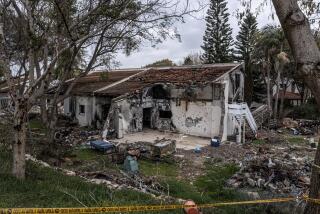Israelis and Palestinians Harbor Widely Different Visions of Probe
- Share via
JERUSALEM — Ask Israelis and Palestinians what they expect from a U.S.-backed fact-finding committee probing the region’s devastating wave of bloodshed, and the answers are worlds apart.
Israel expects the committee, which arrived here Monday and is headed by former U.S. Sen. George J. Mitchell (D-Maine), to take a narrow look at the immediate causes of the 10 1/2-week-old upheaval and to recommend ways to stop it and prevent it from recurring.
The Palestinian Authority seeks a far-reaching examination of root causes of the Arab-Israeli conflict, something more akin to the “truth commissions” of South Africa or Guatemala, that will lead to “achievement of a just, lasting and comprehensive peace,” according to a position document submitted to the panel Friday.
5-Member Panel Meets With Barak, Arafat
With those competing visions as the backdrop, the five-member committee began its work, meeting separately with Israeli Prime Minister Ehud Barak and Yasser Arafat, the president of the Palestinian Authority, before departing after spending barely a day here.
The committee was formed at the urging of President Clinton during an otherwise failed emergency summit at Sharm el Sheik, Egypt, in October. Desperate to stem the violence, Clinton met there with Barak and Arafat and agreed to a so-called fact-finding committee. The agreement fell far short of Palestinian demands for a full international probe but forced Israel to accept some outside scrutiny, which it had resisted.
Palestinians now say the Israelis have succeeded in further diluting the mission of the committee. Several Palestinian human rights groups announced Monday that they would refuse to participate in the probe, charging that it will be little more than a whitewash.
Of more than 310 people killed since Sept. 28, when the clashes erupted, about 85% have been Palestinians, many of them younger than 18. Leading international human rights organizations and the U.N. Security Council have accused the Israeli army of using excessive force.
As outlined in its 42-page position paper, the Palestinian leadership wants Israel to be examined in view of its role as an occupying force that is obliged to obey the Geneva Conventions and United Nations resolutions. Issues such as Jewish settlement in the West Bank and Gaza Strip and measures of “collective punishment,” such as border closures and economic blockades, should also be investigated, the Palestinians say.
Israel argues that Arafat and other Palestinian leaders are to be blamed for inciting and orchestrating the violence, with the ultimate goal of gaining international sympathy and concessions they could not win at the bargaining table. Israel, which denies that its soldiers have used excessive force, intends to submit written materials to the committee outlining what it says are repeated violations of accords and cease-fire agreements by Arafat.
A Fear Committee Could Be Used as Tool
Israeli officials were adamant that the scope of the inquiry be limited, saying that this was the only way the committee could avoid being used as a propaganda tool.
“It is unreasonable on the Palestinian side to add topics that should not be covered,” said Alon Liel, director general of Israel’s Foreign Ministry. “We do not want the committee to start dealing with issues that might increase the already inflamed emotions and widen the differences between the sides.”
Liel said the committee will do most of its work based on written reports from both sides and will not interview individuals without notifying Israeli or Palestinian authorities. He and other officials said Israel welcomes the committee and has nothing to hide.
In addition to Mitchell, who brokered the faltering Good Friday peace accord for Northern Ireland in 1998, the commission consists of Javier Solana, a Spanish diplomat and senior official of the European Union; former U.S. Sen. Warren B. Rudman (R-N.H.); former Turkish President Suleyman Demirel; and Thorbjorn Jagland, the foreign minister of Norway.
Members of the committee insisted that they would be impartial but confirmed the limited scope of their mandate. “The committee is not a tribunal,” said Solana, a former secretary-general of the North Atlantic Treaty Organization.
The committee will spend the next few days in consultations in Egypt and Jordan. The probe is to be completed by March.
The Palestinians hope that the commission’s work will ultimately lay the groundwork for placing an international protection force between Israel and Palestinian-ruled territories, something that Israel adamantly opposes.
Violence Erupted After Visit to Holy Site
The current round of violence erupted after right-wing Israeli opposition leader Ariel Sharon and a small army of police visited a Jerusalem compound that is Judaism’s holiest site but also home to the Al Aqsa mosque, which is sacred to Muslims. Heated demonstrations spread in succeeding days to the West Bank and Gaza. Today, widespread demonstrations have been largely replaced by nightly shootouts and sniper fire.
On Monday, Israeli troops shot dead a prominent member of the radical Islamic Jihad group in the West Bank city of Nablus. Israelis said he shot first; Palestinians said he was unarmed.
More to Read
Sign up for Essential California
The most important California stories and recommendations in your inbox every morning.
You may occasionally receive promotional content from the Los Angeles Times.











